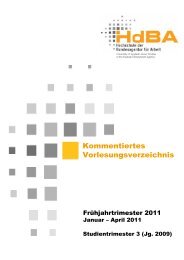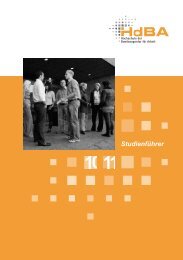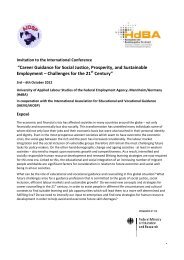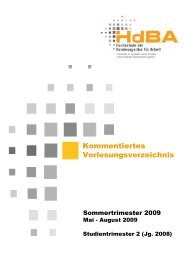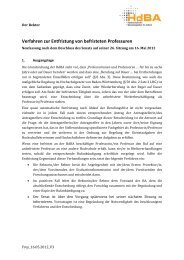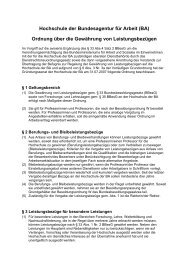Brain Drain - Hochschule der Bundesagentur für Arbeit
Brain Drain - Hochschule der Bundesagentur für Arbeit
Brain Drain - Hochschule der Bundesagentur für Arbeit
You also want an ePaper? Increase the reach of your titles
YUMPU automatically turns print PDFs into web optimized ePapers that Google loves.
���������������������������������������������������<br />
���������������������������������������<br />
�<br />
�<br />
2. Course 2: Validation of Informal Competences and Informal/nonformal<br />
learning<br />
2.1 Learning Objectives<br />
• Counsellors are aware of validation strategy of non-formal and informal learning in<br />
European policy context. (TAX 2 – foundation competences)<br />
• Counsellors are aware of national motives for pursuing the validation of non-formal<br />
and informal learning. (TAX 2 – foundation competences – supporting<br />
competences)<br />
• Counsellors are able to provide information regarding “other” competencies to<br />
clients wanting to try their luck abroad. (TAX 3 – client-interaction competences)<br />
• Counsellors are able to show the importance and various ways of marketing nonformal<br />
and informal learning skills to their clients. (TAX 3 – client-interaction<br />
competences)<br />
2.2 Unit 1: Validation and Recognition of Non-formal and Informal<br />
Learning in Europe<br />
� Validation of non-formal and informal learning is increasingly seen as a key to<br />
realise lifelong learning.<br />
� In the last decade making non-formal and informal learning visible has been at the<br />
forefront of many public policies in the European Union.<br />
According to the European legislation “Recognition of non-formal and informal<br />
learning (in the field of youth)”, these kinds of learning are important because they<br />
(please see http://europa.eu/scadplus/leg/en/cha/c11096.htm):<br />
� are complementary to the formal education and training system;<br />
� have a participative and learner-centred approach;<br />
� are carried out on a voluntary basis and are therefore closely linked to young<br />
people's needs, aspirations and interests. By providing an additional source of<br />
learning and a possible route into formal education and training, such activities are<br />
particularly relevant to young people with fewer opportunities;<br />
� take place in a wide and varied range of settings.<br />
European countries are divided into three main groups*<br />
� First, those countries where validation has become a practical reality for individual<br />
citizens.<br />
� Second, those countries where validation is emerging as a practical reality<br />
� Third, those countries where activity is low or non-existent (Turkey is one of them).<br />
131








